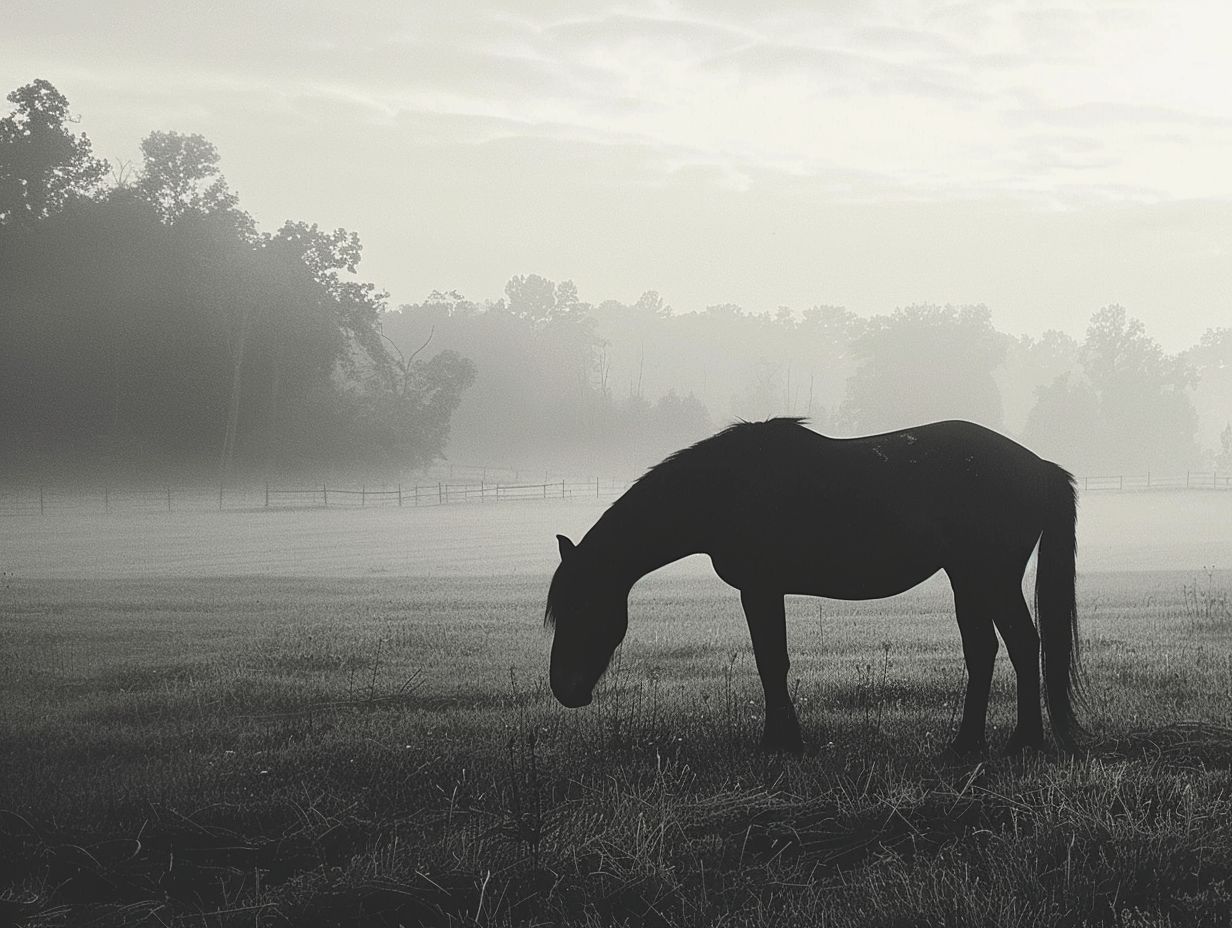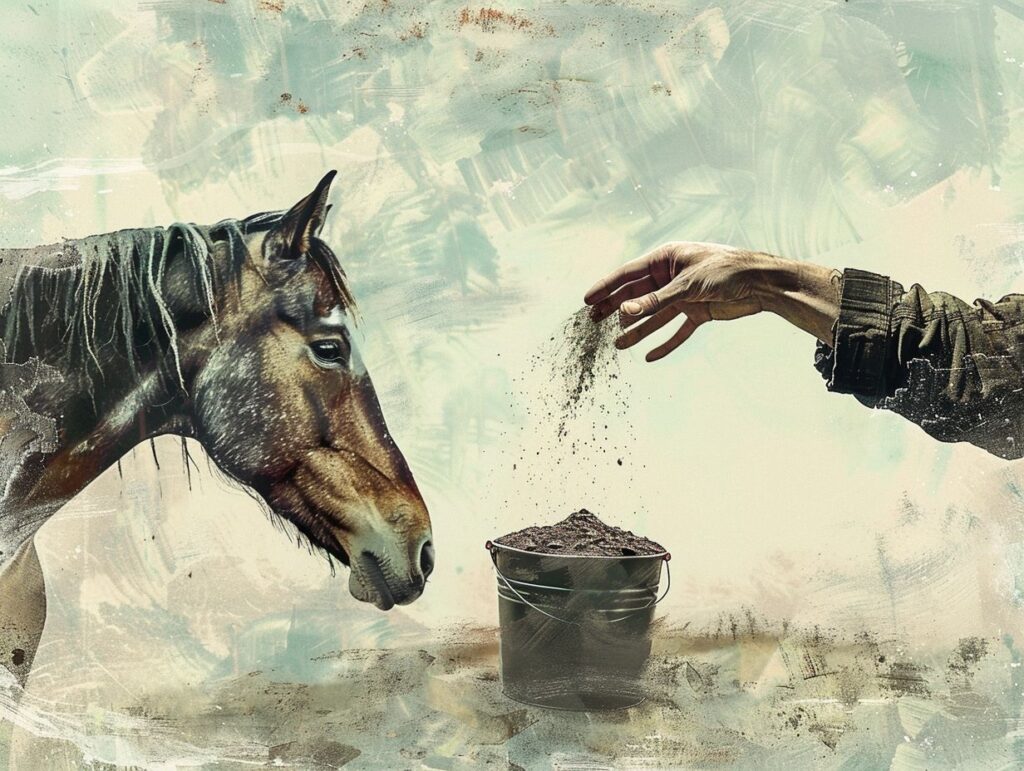Dehydration in horses is a serious concern that can have significant impacts on their health and performance.
When considering the causes, signs, and symptoms of dehydration in horses, it is important to be aware of the potential risks involved. Additionally, understanding how to prevent dehydration is crucial in maintaining the well-being of your equine companions.
Exploring effective methods for rehydrating horses is essential in addressing dehydration promptly. It is also important to acknowledge the potential complications and long-term effects that may arise from inadequate hydration.
By learning more about how to keep your equine friends healthy and well-hydrated, you can proactively safeguard their health and overall performance.
Understanding Dehydration in Horses

Understanding dehydration in horses is crucial to maintaining their health and well-being, as it can have serious consequences if left unmanaged.
Dehydration in horses can not only affect their physical health but also impact their performance and overall quality of life. Horses, like all living beings, require a proper balance of fluids to function optimally. When a horse becomes dehydrated, it can lead to issues such as decreased energy levels, poor digestion, and even more serious conditions like colic. Recognizing the signs of dehydration and taking prompt action to rehydrate the horse is essential for preventing potential health complications and ensuring that they can continue to thrive in their daily activities.
Causes and Risk Factors
Dehydration in horses can be caused by various factors such as inadequate water intake, excessive sweating, heat stress, or underlying health conditions.
Insufficient water intake is a primary trigger for dehydration in horses, as they require a consistent supply of water to maintain proper bodily functions. During intense physical activity, horses can lose significant amounts of fluid through sweating, especially in hot weather conditions. Heat stress further exacerbates this issue, leading to increased fluid loss. Underlying health issues such as gastrointestinal problems or fever can also disrupt the body’s fluid balance, heightening the risk of dehydration in horses.
Signs and Symptoms of Dehydration in Horses
Recognizing the signs and symptoms of dehydration in horses is critical for prompt intervention and treatment to prevent further complications. Dehydration in horses may present with physical indicators such as sunken eyes, loss of skin elasticity, dry mucous membranes, and an increased heart rate. Behavioral signs can include lethargy, decreased appetite, and dark urine. It is essential to be observant of these signs because early detection enables timely rehydration measures.
Neglecting dehydration in horses can result in severe health issues like colic, organ damage, and decreased performance. Therefore, maintaining vigilance and taking immediate action upon noticing any dehydration symptoms are vital steps in preserving your horse’s health and well-being.
Physical and Behavioral Indicators
You can identify dehydration in horses by observing various physical and behavioral indicators. These signs include skin tenting, dry mucous membranes, lethargy, dry mouth, and sunken eyes.
Skin tenting, a classic sign of dehydration in horses, can be assessed by gently pinching the skin on the horse’s neck or shoulder. If the skin remains tented or takes longer than expected to return to its original position, it suggests dehydration.
Another important indicator is dry mucous membranes, such as the gums and inside the nostrils, which should typically appear moist in a well-hydrated horse.
Lethargy, characterized by reduced energy levels and interest in activities, is also commonly observed in dehydrated horses.
Preventing Dehydration in Horses

Preventing dehydration in horses requires a proactive approach that focuses on ensuring adequate water intake, maintaining electrolyte balance, and implementing preventive measures.
Ensuring consistent access to fresh, clean water is crucial for maintaining hydration levels in horses. Introducing electrolyte supplements can aid in replenishing minerals lost through sweat, especially during periods of intense exercise or hot weather. Monitoring the horse’s water consumption and observing for early signs of dehydration, such as increased heart rate or dry mucous membranes, can facilitate early intervention. By incorporating these strategies into daily care routines, horse owners can effectively prevent dehydration and promote optimal health and performance in their equine companions.
Tips for Proper Hydration
Ensuring proper hydration in horses involves providing them with access to fresh water at all times, monitoring their electrolyte balance, and adjusting their water intake based on weather conditions and activity levels. It is crucial for horse owners to understand the signs of dehydration in horses to take timely preventive measures. Common indicators of dehydration include dark urine, dry skin, lethargy, and sunken eyes. To prevent dehydration, offering salt blocks or electrolyte supplements can help replenish lost minerals. Additionally, incorporating wet feeds into their diet can increase their water intake. It is important to regularly check water sources for cleanliness and ensure that horses have sufficient access to water during transportation or exercise to effectively manage their hydration levels.
Treating Dehydration in Horses
Effective treatment of dehydration in horses involves implementing rehydration strategies that prioritize restoring fluid balance, electrolyte levels, and facilitating the horse’s recovery.
Ensuring adequate water intake is essential for rehydrating horses, particularly as they can experience significant fluid loss through sweating during exercise or in hot weather. Electrolyte supplementation is crucial for maintaining appropriate hydration levels by replenishing essential minerals lost through sweating.
It is imperative to monitor the horse’s hydration status and electrolyte levels closely throughout the rehydration process to mitigate any potential complications. Post-treatment care should encompass a gradual reintroduction of feed and exercise to aid in the horse’s complete recovery.
Effective Methods for Rehydration
Rehydrating a dehydrated horse often involves a combination of strategies. One method is the administration of oral electrolyte solutions, specifically formulated to replace essential minerals lost during dehydration. These solutions can be administered directly into the horse’s mouth or mixed into their drinking water.
Alternatively, intravenous fluid therapy may be recommended for more severe cases of dehydration. This method involves the direct delivery of fluids into the horse’s bloodstream under the supervision of a veterinarian.
In either case, the gradual reintroduction of water and feed is essential. This approach helps prevent rehydration-related complications and supports the horse in effectively regulating its water intake during the recovery process.
Complications and Long-Term Effects of Dehydration in Horses

If untreated, dehydration in horses can result in various complications that significantly impact their health and performance. These include colic, reduced performance, skin tenting, and changes in mucous membrane color.
Undoubtedly, dehydration poses significant risks to horses if left unaddressed. Colic, a potentially fatal digestive disorder, is a prominent concern associated with dehydration. This condition can cause severe discomfort and distress in horses, negatively affecting their overall well-being.
Additionally, decreased performance levels are commonly observed in dehydrated horses, impairing their ability to engage effectively in physical activities. Skin tenting, a clear indicator of dehydration, demonstrates the loss of skin elasticity due to water deficiency. Changes in mucous membrane color, indicating poor hydration status, are critical warning signs that should not be overlooked.
Impact on Horse’s Health and Performance
Dehydration in horses can have a significant impact on their health and performance, affecting their overall well-being and athletic capabilities. Inadequate hydration levels can lead to a variety of complications in horses, including decreased muscle function, lethargy, and an increased risk of heat stress.
Over time, chronic dehydration can result in issues such as kidney damage, colic, and reduced immune function. Proper hydration plays a crucial role in maintaining optimal health and peak performance in horses. It helps regulate body temperature, aids digestion, and facilitates efficient nutrient absorption.
Ensuring that horses have access to clean, fresh water at all times is essential for preventing dehydration and promoting their overall well-being.
Frequently Asked Questions
What are the signs of dehydration in horses?
Some common signs of dehydration in horses include dry skin and sunken eyes, loss of skin elasticity, dark urine, and lethargy. They may also appear weak and have decreased appetite.
What should I do if I suspect my horse is dehydrated?

If you suspect your horse is dehydrated, it is important to offer them fresh, clean water and electrolytes. You can also check their hydration levels by gently pinching the skin on their neck – if it takes longer than two seconds to snap back, they may be dehydrated.
How can I prevent dehydration in my horse?
The best way to prevent dehydration in horses is to ensure they always have access to clean, fresh water. This is especially important during hot weather or when they are being exercised. You can also offer them electrolytes to replenish any lost during sweating.
What are the dangers of dehydration in horses?
Dehydration can lead to serious health issues in horses, such as colic and heat exhaustion. It can also impact their performance and overall well-being. If left untreated, severe dehydration can be life-threatening for horses.
Are there any other warning signs to look out for?
Plus physical signs, such as dry skin and sunken eyes, there are other warning signs to watch out for. These include an increased heart rate, elevated body temperature, and dark colored gums. If you notice any of these, it is important to take action immediately.
What can I do to help rehydrate my horse?
Plus offering water and electrolytes, you can also sponge your horse with cool water to help bring down their body temperature. If they are severely dehydrated, it may be necessary to administer fluids intravenously. It is always best to consult with a veterinarian for proper treatment and care.


